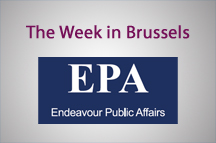 Anyone involved in public affairs, particularly EU public affairs, over the last few weeks is likely to be feeling a little dazed and tired at present, and very much looking forward to the summer break.
Anyone involved in public affairs, particularly EU public affairs, over the last few weeks is likely to be feeling a little dazed and tired at present, and very much looking forward to the summer break.
This week marked one month since the UK voted to leave the EU. It was also the week when the reality of Brexit kicked in and the talking began.
In a sign that Brexit really does mean Brexit, the week began with the news that the UK had voluntarily given up its EU presidency which was due to take place in the second half of next year; this will now be taken by Estonia.
 Following some technical difficulties, Boris Johnson, the UK’s new Foreign Secretary, made it to Brussels for his first meeting of EU foreign ministers. With French Foreign Minister Jean-Marc Ayrault having called Mr Johnson a “liar” only days before, it looked set to be an interesting first meeting. However, with the terrible events in Nice and the failed military coup in Turkey dominating the agenda everyone’s attention will have been focussed on more important things, much to the relief, I would imagine, of Boris.
Following some technical difficulties, Boris Johnson, the UK’s new Foreign Secretary, made it to Brussels for his first meeting of EU foreign ministers. With French Foreign Minister Jean-Marc Ayrault having called Mr Johnson a “liar” only days before, it looked set to be an interesting first meeting. However, with the terrible events in Nice and the failed military coup in Turkey dominating the agenda everyone’s attention will have been focussed on more important things, much to the relief, I would imagine, of Boris.
On Wednesday, fresh from her first Prime Minister’s Question Time, Theresa May flew first to Berlin to meet with Chancellor Merkel, who like Mrs May is the daughter of a clergyman, and then onto Paris to meet with President Hollande. Under the circumstances the UK Prime Minister will be happy with the outcome of these meetings – securing agreement from President Hollande to keep the UK’s border controls in Calais and being granted the necessary breathing space by Chancellor Merkel so that the UK can work out exactly what Brexit means.
 Going back to events in Turkey. After Brexit, this was clearly the major issue dominating the EU agenda this week as attention moved from the failed coup and focussed on President ErdoÄŸan’s response. Just as there had been universal condemnation of the attempted coup, the EU’s foreign ministers were united in their concern at President ErdoÄŸan’s attempt to restore order with some, including Belgian Foreign Minister Didier Reynders stating that they “can’t imagine” Turkey ever becoming an EU member if the President jailed judges or reinstated the death penalty. It is clear that events in recent days, including a “temporary” suspension of Turkey’s membership of the ECHR, have seriously damaged EU/Turkey relations. This is also likely to bring to an end the migration deal recently agreed between the Turkish Government and EU leaders, giving EU leaders something else to worry about.
Going back to events in Turkey. After Brexit, this was clearly the major issue dominating the EU agenda this week as attention moved from the failed coup and focussed on President ErdoÄŸan’s response. Just as there had been universal condemnation of the attempted coup, the EU’s foreign ministers were united in their concern at President ErdoÄŸan’s attempt to restore order with some, including Belgian Foreign Minister Didier Reynders stating that they “can’t imagine” Turkey ever becoming an EU member if the President jailed judges or reinstated the death penalty. It is clear that events in recent days, including a “temporary” suspension of Turkey’s membership of the ECHR, have seriously damaged EU/Turkey relations. This is also likely to bring to an end the migration deal recently agreed between the Turkish Government and EU leaders, giving EU leaders something else to worry about.
Fresh from his role in the Leave campaign, Nigel Farage was in the US this week speaking at the Republican Convention. No longer in charge of UKIP, and perhaps looking for something to fill his time, Mr Farage announced that he would be dusting down his battle bus in September and going on a tour of European cities, supporting other independence campaigns and encouraging citizens of other Member States to follow the UK’s example in voting to leave the EU.
Whilst Nigel was wooing the Republicans, Democrat Secretary of State John Kerry was in Europe. Those hoping that TTIP had been kicked into the long grass will have been disappointed to hear Mr Kerry state that post Brexit, TTIP was even more essential, and that the US Government was committed to concluding a free trade deal with the EU this year.
 In other news, it was a bad week for vaping as the Finish Government announced plans to impose a tax of 30 cents per ml of e-liquid, increasing the costs by half. At the same time, the Greek Health Ministry published a draft bill that would prohibit vaping in enclosed public places.
In other news, it was a bad week for vaping as the Finish Government announced plans to impose a tax of 30 cents per ml of e-liquid, increasing the costs by half. At the same time, the Greek Health Ministry published a draft bill that would prohibit vaping in enclosed public places.
Normally this time of year is known as the silly season, allowing public affairs professionals to go off and enjoy a well-earned break. However, with so many serious events set to dominate the agenda over the summer relaxation may prove a little harder than normal. Perhaps though we should relax, after all, an article in today’s Daily Express confidently predicts that the world will end next Friday!














